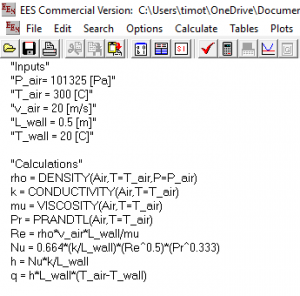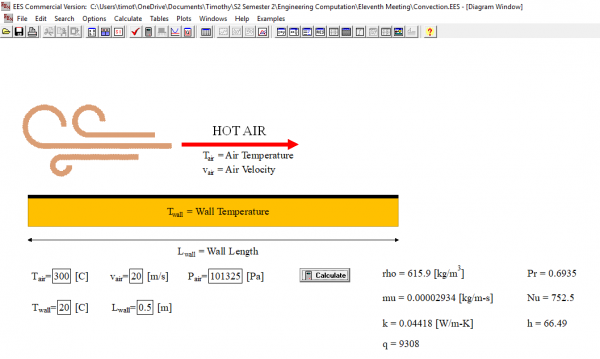Difference between revisions of "Eleventh Class Meeting - Timothy Felix Vickary"
(Created page with "== RESUME == <p align="justify">How to measure gratefulness? It is by contemplating of how many times we are complaining and grumbling. Mr DAI will assess and give score in th...") |
(→RESUME) |
||
| Line 1: | Line 1: | ||
| − | == | + | == Class Summary == |
| − | <p align="justify"> | + | <p align="justify">Today class was discussing about what is convection and how to determine the heat transfer using EES software. Brief exchanging definition about convection was held and several answers are: |
| + | #Heat transfer with fluid as medium | ||
| + | #Heat transfer followed with the particle movement | ||
| + | #Combination of conduction and advection</p> | ||
| + | |||
| + | <div style="font-size:100%;">'''Question'''</div> | ||
| + | <p align="justify">To give better understanding and appliance of the knowledge, the following problem is given: | ||
| + | Calculate convection properties of air with velocity of 20 m/s and Temperature 300 C which is moving above a wall with the length of 0.5 and temperature at 20 C. Assumed the wind flow is laminar Other unknown parameters can be define on your own.</p> | ||
| + | |||
| + | <div style="font-size:100%;">'''Answer'''</div> | ||
| + | <p align="justify">Convection as one componenet of heat tansfer has its own elaborated equation in differential form which is | ||
| + | [[File:Convection in differential equation.png|center|thumb|upright=1.1|]] | ||
| + | However, since the known dimension of wall only its length then the thermal energy (Q) can be in the dimension of length (Watt/m) | ||
| + | |||
| + | Considering the convection equation we need to determine the value of Nusselt number. We could think the wall as a thin film, therefore the governing equation for nusselt number is | ||
| + | [[File:Nusselt number.png|center|thumb|upright=0.7|]] | ||
| + | and the relation of convection coefficient and nusselt number is | ||
| + | [[File:Nusselt number and convection coefficient relation.png|center|thumb|upright=1|]] | ||
| + | For reynold number we follow the equation below | ||
| + | [[File:Reynold number.png|center|thumb|upright=1|]] | ||
| + | Since the value of pressure is not yet determiner, 1 atm or 101325 Pascal would be a better suggestion. Having all required knowledge and equation complete, we can go further into the insertion equation in EES. | ||
| + | |||
| + | Below shown the EES equation for convection on open plat surface | ||
| + | [[File:Equation convection.png|center|thumb|upright=1|]] | ||
| + | and the formatted equation would be | ||
| + | [[File:Formatted equation convection.png|center|thumb|upright=1|]] | ||
| + | |||
| + | To challenge myself, i create a window diagram to give a friendly user interface where user could input any data as provision then could be calculated and giving the output which is shown below | ||
| + | [[File:Window diagram.png|center|thumb|upright=2|]] | ||
| + | The picture above has also shown the result from the given problem. | ||
| + | |||
| + | If you are interested in seeing and trying the diagram window, you could download from this link https://bit.ly/2Dq7Hdx | ||
Latest revision as of 12:16, 22 April 2019
Class Summary
Today class was discussing about what is convection and how to determine the heat transfer using EES software. Brief exchanging definition about convection was held and several answers are:
- Heat transfer with fluid as medium
- Heat transfer followed with the particle movement
- Combination of conduction and advection
To give better understanding and appliance of the knowledge, the following problem is given: Calculate convection properties of air with velocity of 20 m/s and Temperature 300 C which is moving above a wall with the length of 0.5 and temperature at 20 C. Assumed the wind flow is laminar Other unknown parameters can be define on your own.
Convection as one componenet of heat tansfer has its own elaborated equation in differential form which is
However, since the known dimension of wall only its length then the thermal energy (Q) can be in the dimension of length (Watt/m)
Considering the convection equation we need to determine the value of Nusselt number. We could think the wall as a thin film, therefore the governing equation for nusselt number is
and the relation of convection coefficient and nusselt number is
For reynold number we follow the equation below
Since the value of pressure is not yet determiner, 1 atm or 101325 Pascal would be a better suggestion. Having all required knowledge and equation complete, we can go further into the insertion equation in EES.
Below shown the EES equation for convection on open plat surface
and the formatted equation would be
To challenge myself, i create a window diagram to give a friendly user interface where user could input any data as provision then could be calculated and giving the output which is shown below
The picture above has also shown the result from the given problem.
If you are interested in seeing and trying the diagram window, you could download from this link https://bit.ly/2Dq7Hdx




